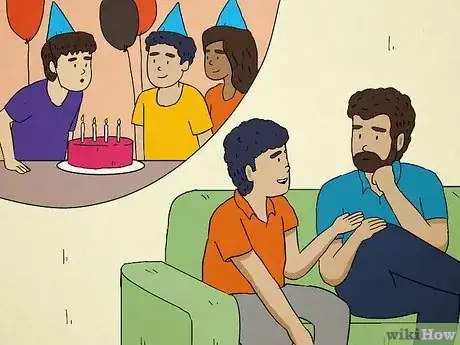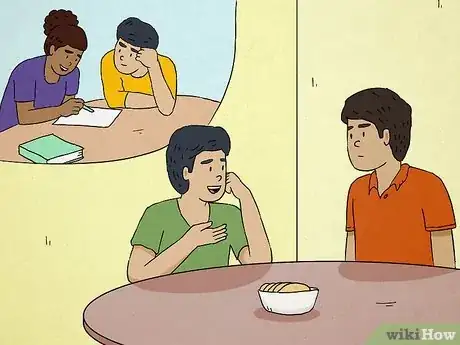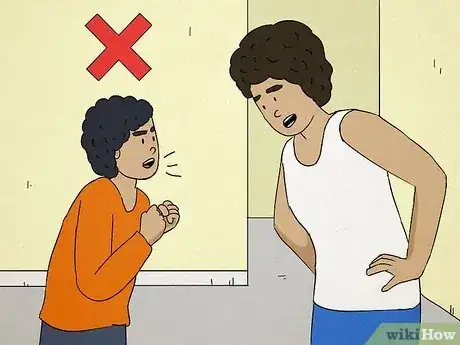This article was co-authored by Kim Chronister, PsyD. Dr. Kim Chronister is a Licensed Clinical Psychologist. She specializes in helping people struggling with substance abuse, relationship problems, eating disorders, and personality disorders. Dr. Chronister has contributed to and appeared on Access Hollywood, Investigation Discovery, and NBC News. She is the author of “Peak Mindset” and “FitMentality.” She holds an MA in Clinical Psychology and a Doctor of Psychology (PsyD) from Alliant International University.
This article has been viewed 96,456 times.
Finding a group of friends you really click with in high school can be hard. However, once you find those friends it can be even harder if your parents don’t like them. As a teenager, your parents have some control over the places you go and the people you see, so arguments over friends can add stress to your relationship. If you’re open with your parents and respond with maturity you can help convince your parents that your friends are good people.
Steps
Talking to Your Parents
-
1Find a good time to talk. A conversation about your friends is one that you want your parents to take seriously, so make sure you treat it that way. Don’t ask your parents in the middle of cooking dinner or right as you’re heading out the door to school. Look for, or help create, a good time to talk.
- Ask your parents to go for a walk with you.
- Stay at the table with your parents after dinner to talk.
- Instead of turning on a movie or TV show, sit with your parents and start a conversation.
- Finding a proper time and a proper tone can be helpful for successfully delivering your message.
-
2Set a reasonable goal. If your parents are concerned about your friends, then immediately expecting them to let you go on an overnight trip somewhere isn’t going to happen.[1] Think about something specific and start by discussing that.
- Having friends over for a movie night once a month.
- Going to a friend’s birthday party.
- Grabbing a pizza with friends after soccer practice.
Advertisement -
3Plan what you want to say. Talking with your parents can be stressful, especially when it’s about a difficult topic. When emotions take over a conversation we tend to become angry or forget what we wanted to say. Practice the conversation in front of a mirror or write down what you want to say. This will also show your parents you’re serious about this conversation.
-
4Address their concerns. Ask your parents why they don’t like your friends. You can’t convince your parents you have good friends unless you know what they dislike about them. Once you hear their concerns, you will be able to address the issues.[2]
- If your parents express concern over a friend’s driving, try responding with, “Tommy can get a little distracted when driving, but I don’t think he has any tickets. If it makes you uncomfortable than I won’t ride in any car he’s driving. Jacob is a very responsible driver, I promise to ride with him any time we go someplace.”
- If your parents are worried about the type of language a friend uses, help reassure them that it’s not influencing your behavior: “I’m sorry you’ve heard her using inappropriate language. I don’t talk that way and I’ll make sure she understands what is and isn’t appropriate to say in the house.”
- If your parents know that a friend smokes, you need let them know that it doesn’t affect your choices. “I know Sam smokes, and I don’t like it either. But he is still a good, trustworthy friend and doesn’t smoke around me.”
- If you do have a friend that smokes, try talking to them about quitting![3]
Establishing Trust
-
1Tell the truth. If your parents asks you something about your friend, don’t lie. Your parents may already know the answer and are testing to see if you’ll be honest with them. And if not, the truth almost always comes out anyway. Additionally, if your parents see that you recognize the good and bad in your friend, you can talk about how you disagree with what your friend did, and show them you are mature enough to make your own choices.[4]
-
2Stress the positives. Help your parents understand why your friends are good people. If all they’ve heard are the negatives, then that’s all they can base their opinion on.
- Let your parents know if your friends help you in school: “Susan is great at math and helped me study today at lunch.”
- Tell your parents when your friend supported you: “Matt ran with me when I started falling behind at track practice today.”
- Remind your parents that friends help you have fun: “I was laughing so hard today when Jess did a spot-on celebrity impression!”
-
3Tell your friends your parents’ expectations. Make sure that your friends know your parent’s rules. They may be different from their own rules, and need to respect your parents while in their house. Sometimes your parents might not like a friend because of small behaviors, or different parental expectations for manners. Show your parents that you and your friends can be mature together.[5]
-
4Invite your friends to your house. Give your parents the opportunity to spend some time with your friends. Once they get to know your friends and see how well you can behave together, they will be more comfortable with you seeing friends outside of your house.
Acting Maturely
-
1Talk about how you’re changing. Your parents may not like your friends because they think you’re changing who you are to be with them. Help reassure your parents that not all changes are negative. Teenage years are a time for you to expand and grow; tell them why being with these friends is a positive change for you.
- If you’re trying out for a new sport, tell your parents, “She’s a star on the basketball team and is helping me practice for tryouts.”
- If you are interested in joining a new club, say, “He’s signing up for the yearbook committee too.”
- If you have a new goal, let your parents know, “We both want to go to college for biology.”
-
2Thank your parents. Tell them how much you appreciate that they took the time to listen to you and to get to know your friends better. Let your parents know that your relationship with your friends is important to you but you don’t want it to strain your relationship with them.[6]
-
3Take on more duties around the house. If you’re trying to convince your parents that you can pick your own friends, you need to show them that you’re responsible. Offer to take out the trash or clean the dishes. Talk to them about the schoolwork you’re completing. Help reassure them that you’re responsible in your actions and the choices you make.
-
4Accept their decision. Even if you have a well-planned discussion, talk maturely, and think you have a reasonable request, your parents may still dislike your friends and not let you see them. While this seems like the peak of unfairness you still have to respect their decision. They way you respond to this will likely influence their decisions in the future.
- Do not scream at them about how unfair they’re being.
- Do not resort to name calling.
- Do let them know that you’re upset with, but will respect, their decision. Assert your feelings about their decision but let them know that your relationship is important to you.
- Do tell them that you hope this is something you can discuss again in the future.
Warnings
- Don’t resort to shouting or harsh words. If you’re trying to show your parents you can be responsible with your friends you need to show them you can act maturely during conflict.⧼thumbs_response⧽
- If your parents forbid you from hanging out with a friend, don’t sneak out and break their rule. Acting irresponsibly will only confirm their worry that these friends aren’t good for you to be around.⧼thumbs_response⧽
References
- ↑ http://kidshealth.org/en/teens/talk-to-parents.html
- ↑ https://www.girlshealth.gov/relationships/friendships/socialworker.html
- ↑ http://kidshealth.org/en/teens/quit-smoking.html#
- ↑ https://kidshealth.org/en/kids/talk-parents.html
- ↑ http://www.cyh.com/HealthTopics/HealthTopicDetailsKids.aspx?p=335&np=282&id=2535#4
- ↑ https://www.quora.com/What-should-I-do-My-parents-dont-let-me-do-anything-with-my-friends-and-I-dont-have-a-life









































































